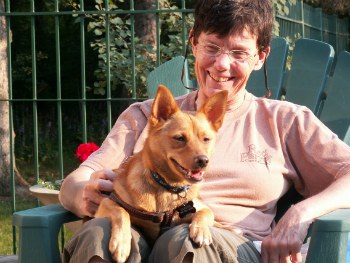
Dr. Karen Fox and her dog Zander are active in the community, volunteering in a pet therapy program for people experiencing major mental illnesses. Photo credit: Lawrie Smith
When Robert Frost penned his famous poem, "The Road Not Taken," he may well have been writing it for leisure professor Karen Fox, who has rarely, if ever, shied from exploring leisure topics some might think were well off the beaten path.
On the journey she's pioneered leisure studies in hip hop and Aboriginal young people, Native Hawaiian people's perspectives of leisure; she's walked in the footsteps of one of Canada's most famous outdoorswomen, Margaret Fleming, and is about to embark on a study of yoga and meditation's benefits on neuromuscular disease.
"I do the kind of leisure research that typically doesn't get done," she says with a wry smile.
But it has come to the notice of her peers. This year her life's work has earned her the recognition of the Academy of Leisure Sciences, an honorary society "composed of eminent scientists who have made outstanding and distinctive contributions to the leisure, park and recreation sciences" which, this month, confers the title of Fellow on Fox. The 113-strong academy is filled with North America's most notable scholars in the field and Fox says she's delighted to be numbered among them.
"I am honoured," she says. "This shows the vibrancy and robustness of the academy and to the range of leisures it honours. It's also gratifying to increase the ranks of Canadians in the Academy too."
To Fox, "my research has always been about trying to rethink 'leisures' theory - and I do mean 'leisures' because that honours a cultural pluralism and diversity in terms of abilities and philosophies in the world. How do we rethink leisures so that we have a variety of aspects and to think through the democracy of leisure and keep everybody at the table?"
"I've always wanted my research to be tied to what's occurring in the real world," she says. "I want to know how people create leisure on their own when they have a chance to do it as opposed to going to pre-existing programs. What happens when people can't go to those programs because of race, ability or gender? What happens outside of what we say is appropriate leisure or what we study? Most leisure study has to do with physical activity than with arts, reading, cultural practices, or activities outside of the norm. All of these things interest me because they are leisure and we don't have a theory that begins to encompass them."
Fox began working with Aboriginal youth when her doctoral student Brett Lashua, a talented musician, wanted to explore music as leisure for his doctoral degree. "I was interested in how difficult it was for these young people to access something of their own choosing-something they thought would be vital to them."
The Aboriginal young people found their own form of expression through hip hop, says Fox. "They intuitively knew what they needed that was healing, productive, expressive, that moved them to healthier choices and it was their creation. Most would not have lasted in the traditional programs or could have cared less about the typical physical activities promoted in mainstream recreation. And urban hip hop is far more collaborative, participatory and fluid, which fits both Indigenous philosophies and the conditions they needed to create given that much of their life was regulated or people were trying to make them into something else, or control them."
Born in Hawaii, Fox's affinity to, and research on, Native Hawaiians' perspectives of leisure is ongoing, particularly in light of the illegal annexation of the Kingdom of Hawaii in the 19th Century, followed by repressive laws governing dress and leisure that marginalized, belittled or excluded Native Hawaiians and their culture. "It is also one of the few indigenous languages that has a word for leisure in it," she says.
As she looks to the future Fox doesn't see ending her career anytime soon. Besides launching into a study examining the benefits of yoga and meditation for those with neuromuscular diseases, "I have three books I want to write: one on leisure theories, one of Native Hawaiians' understanding and perspective of leisure and one on Margaret Fleming's life."
And if that were not enough, Fox says, "I've always wanted to teach a course on leisure theory based on surfing. And this might become a reality thanks to some colleagues who are putting together such a course. I'm quite delighted they would consider having me 'tag' along."
For Fox, an avid whitewater kayaker who thrives on the unpredictability of the river, the sport is very much a metaphor for her long and eclectic career as a leisure scientist. "A wave is never static; you always have to attend to that. You're never in control but you have to be skillful in how you manoeuvre through that environment. Much like my career. It's been, and is still, an exhilarating ride."
The Road Not Taken
By Robert Frost
Two roads diverged in a yellow wood,
And sorry I could not travel both
And be one traveler, long I stood
And looked down one as far as I could
To where it bent in the undergrowth;
Then took the other, as just as fair,
And having perhaps the better claim,
Because it was grassy and wanted wear;
Though as for that the passing there
Had worn them really about the same,
And both that morning equally lay
In leaves no step had trodden black.
Oh, I kept the first for another day!
Yet knowing how way leads on to way,
I doubted if I should ever come back.
I shall be telling this with a sigh
Somewhere ages and ages hence:
Two roads diverged in a wood, and I-
I took the one less traveled by,
And that has made all the difference.